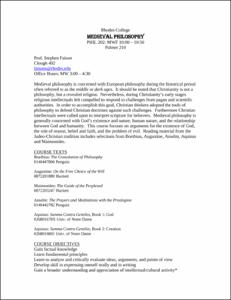Please use this identifier to cite or link to this item:
http://hdl.handle.net/10267/3516| Title: | PHIL 202-01, Medieval Philosophy, Spring 2007 |
| Authors: | Faison, Stephen Eliot |
| Keywords: | Philosophy, Department of;Syllabus;Curriculum;Academic departments;Text;Academic departments;Text;Academic departments;Text;2007 Spring |
| Issue Date: | 11-Jan-2007 |
| Publisher: | Memphis, Tenn. : Rhodes College |
| Series/Report no.: | Syllabi CRN 27289 |
| Abstract: | Medieval philosophy is concerned with European philosophy during the historical period often referred to as the middle or dark ages. It should be noted that Christianity is not a philosophy, but a revealed religion. Nevertheless, during Christianity’s early stages religious intellectuals felt compelled to respond to challenges from pagan and scientific authorities. In order to accomplish this goal, Christian thinkers adopted the tools of philosophy to defend Christian doctrines against such challenges. Furthermore Christian intellectuals were called upon to interpret scripture for believers. Medieval philosophy is generally concerned with God’s existence and nature, human nature, and the relationship between God and humanity. This course focuses on arguments for the existence of God, the role of reason, belief and faith, and the problem of evil. Reading material from the Judeo-Christian tradition includes selections from Boethius, Augustine, Anselm, Aquinas and Maimonides. |
| Description: | This syllabus was submitted to the Rhodes College Office of Academic Affairs by the course instructor. |
| URI: | http://hdl.handle.net/10267/3516 |
| Appears in Collections: | Course Syllabi |
Files in This Item:
| File | Description | Size | Format | |
|---|---|---|---|---|
| 2007_sp_PHIL_202-01_27289.pdf | 30.69 kB | Adobe PDF |  View/Open |
Items in DSpace are protected by copyright, with all rights reserved, unless otherwise indicated.